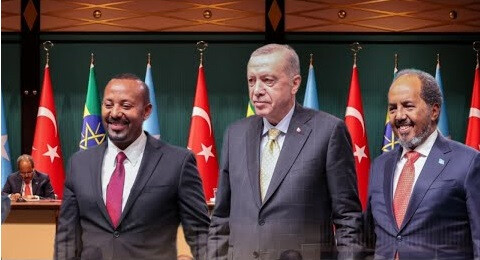
Ankara, Türkiye – In a significant diplomatic breakthrough, Ethiopia and Somalia have signed a landmark agreement in Ankara, facilitated by the Turkish government, aimed at resolving longstanding tensions and fostering cooperation. The "Ankara Declaration" marks a pivotal moment for the Horn of Africa, addressing critical issues of sovereignty, maritime access, and regional security.
The agreement, signed by Ethiopian Prime Minister Abiy Ahmed and Somali President Hassan Sheikh Mohamud, commits Ethiopia to respecting Somalia's territorial integrity, while Somalia has agreed to provide landlocked Ethiopia with secure and sustainable access to the sea. Technical negotiations are scheduled to commence in February 2025, with the goal of finalizing a comprehensive agreement by June.
Key Provisions and Implications:
Respect for Sovereignty: A central element of the accord is Ethiopia's reaffirmation of Somalia's sovereignty, unity, independence, and territorial integrity. This addresses Somalia's concerns regarding a controversial Memorandum of Understanding (MoU) signed between Ethiopia and the breakaway region of Somaliland, which had fueled tensions.
Maritime Access: The agreement secures Ethiopia's long-sought access to the sea, a crucial factor for its economic development. The details of this access will be determined during the upcoming technical negotiations.
AUSSOM Participation: The Ankara Declaration paves the way for Ethiopian troops to participate in the African Union Support and Stabilization Mission in Somalia (AUSSOM), which is set to begin next month. This addresses a key point of contention, as Somalia had previously opposed Ethiopian involvement without a retraction of the Somaliland MoU.
Regional Security: The agreement is expected to enhance cooperation between Ethiopia and Somalia in combating the threat of al-Shabaab, a shared security concern.
Somaliland's Status Remains Uncertain:
The Ankara accord does not explicitly address the status of Somaliland, leaving room for speculation. While some analysts believe Ethiopia's commitment to Somalia's territorial integrity implicitly nullifies the MoU with Somaliland, others argue that Ethiopia may pursue both agreements.
The new Somaliland president Abdirahman Irro, has stated that his government would be open to talks with Mogadishu. This opens a potential pathway for dialogue that was not present with the previous administration.
There is also information that the incoming Trump administration of the United States, plans to push for the recognition of Somaliland.
Analysts suggest that Ethiopia may prioritize its presence in Somalia and its role in AUSSOM, particularly in light of regional security concerns and the need to counter external influences, such as those from Egypt.
Türkiye's Role and Regional Geopolitics:
Türkiye's facilitation of the agreement has drawn widespread praise, highlighting its growing diplomatic influence in the Horn of Africa. Türkiye's own military pact with Somalia, which grants it access to Somalia's exclusive economic zone (EEZ) in exchange for security assistance, underscores its strategic interests in the region.
The agreement comes amidst heightened geopolitical competition in the Horn, with various global powers vying for influence. The potential for proxy conflicts and regional instability has underscored the urgency of resolving tensions between Ethiopia and Somalia.
International Reactions:
The international community, including the African Union (AU), the United Nations (UN), the Intergovernmental Authority on Development (IGAD), the African Transition Mission in Somalia (ATMIS), and the United States, has welcomed the Ankara accord.
The U.S. government, in a statement, praised Türkiye's role and encouraged Ethiopia and Somalia to intensify cooperation on security matters, particularly the fight against al-Shabaab.
Analysis and Outlook:
Analysts view the Ankara Declaration as a significant step towards de-escalating tensions and fostering stability in the Horn of Africa. However, the long-term implications of the agreement, particularly regarding Somaliland's status, remain to be seen.
The ability of both countries to follow through on the technical negotiations, and achieve the goals set out in the declaration will be a major factor in the agreements overall success.
The ever changing geopolitical landscape of the region, will continue to apply pressure, and create new challenges for both Ethiopia and Somalia.
The agreement's success will depend on the commitment of both Ethiopia and Somalia to implementing its provisions and addressing the complex challenges facing the region.
[Copyright (c) Global Economic Times. All Rights Reserved.]




























